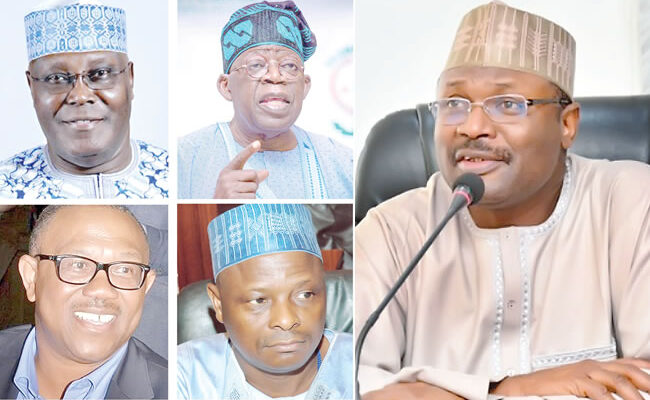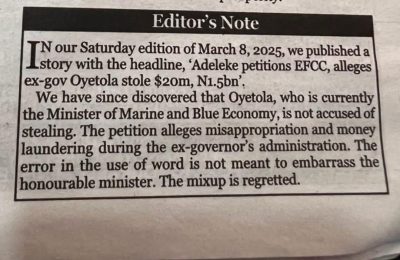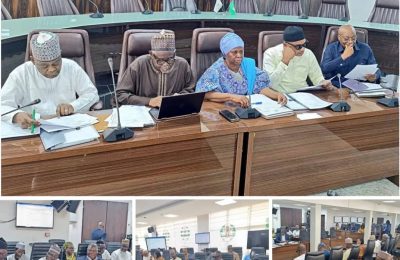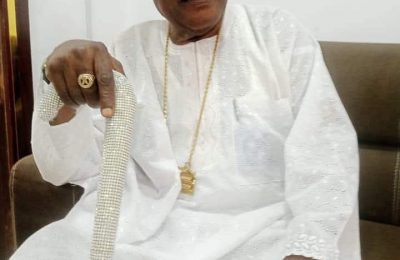
AHEAD of next general election, the Independent National Electoral Commission (INEC) has said that it was determined to ensure that no provisions of the Electoral Act on party finances limits were observed in the breach by the political parties.
National Commissioner, Voters Education and Publicity, Mr Festus Okoye, dropped the hint on Sunday while speaking with the Nigerian Tribune.

He said the commission was already collaborating with security agencies and relevant anti-graft agencies to track the campaign funds of the 18 parties eligible to field candidates at 2023 elections. According to Section 88 of the Electoral Act, N5 billion is the maximum that any political party can spend on presidential election while it gave N1 billion as the spending limit for governorship.
By virtue of Section 88 of the Electoral Act, “The maximum election expenses to be incurred by a candidate at a presidential election shall not exceed N5,000,000,000. The maximum amount of election expenses to be incurred by a candidate in respect of governorship election shall not exceed N1,000,000,000.”
Section 88 (8) also provides that, “No individual or other entity shall donate to a candidate more than N50,000,000.”
The same law forbids candidates and their parties from seeking financial assistance from external forces to contest elections in the country. Section 85 (b) of the Electoral Act 2022 provides that, “Any political party that retains any fund or assets remitted to it from outside Nigeria shall on conviction forfeit the funds or assets to the INEC and in addition, may be liable to a fine of at least N5 million.”
Okoye maintained that no candidate of any party would be allowed to exceed the funding limit for election expenses and provisions of the law which frowns at offshore fund to finance elections in Nigeria.
He said: “The Independent National Electoral Commission (INEC) pursuant to its constitutional and statutory powers released the Guidelines on Finances and Expenses of Parties, Candidates and Aspirants. Based on this, no Political Party or Candidate can feign ignorance of the provisions and intendment of the constitution and the law. We have gone further to train representatives of political parties on our guidelines and reporting format and the limits to spending and the keeping of proper records.
“Secondly, the commission, through its Election and Party Monitoring Department is tracking the expenses of candidates and political parties. The political parties and the candidates are aware of this, and we can at any given time demand to see their records.
“The commission has gone further to involve all the national institutions with oversight function around financial and expenditure.
“The Commission is in close collaboration with the EFCC, the ICPC, the financial intelligence agency, the Police, the various advertisement regulatory agencies and a host of other institutions in the tracking of campaign spending.
“The representatives of these institutions have been meeting with the commission and fine-tuning strategies and mechanisms of making sure that political parties and candidates operate within the law and comply with the extant provisions of the Constitution and the law.
“The commission is determined to conduct a good election and is working collaboratively with other national institutions to sanitize the electoral ecosystem. The credibility of the process is important, and the trust of the Nigerian people is fundamental in the conduct and outcome of the election.”
Okoye further revealed that INEC, in conjunction with the Nigeria Police Force, Economic and Finacial Crimes Commission (EFCC), Independent Corrupt Practices and other related Offences Commission (ICPC) and ARCON is organising a one-day stakeholders’ summit on addressing the influence of money on the 2023 general election.
The Summit is scheduled to hold tomorrow (Monday) in Abuja. Party stakeholders who spoke with the Nigerian Tribune over the weekend, were worried that the limit could hamper their ability to engage with voters.
A leading member of the Atiku/Okowa Presidential Campaign Organisation volunteered: “I think the dimension the Federal Government is going with the withdrawal limit, there is a probability of that affecting electioneering and will create a difference on what normally operates in the polity.”
The source affirmed in a chat that the cash withdrawal limit could cause confusion in the campaigns as the parties would face a huge task mobilizing support.
However, the PDP source alleged that the ruling, the All Progressives Congress (APC) may have already found a way to transfer money to voters in anticipation of the takeoff of the cashless policy.
“Although there are fears that the APC has already devised means of transferring money voters and all that, but that is something we are looking into, we are investigating,” the source said.
However, the Nigerian Tribune investigation showed that while the parties are presently relying of contributions by members to fund campaigns, the prospect of limited cash withdrawal had eliminated any worries about the campaign funding limit set by the Electoral Act.
It was learned that the parties were not worries about running foul of the campaign funding cap as they believed the cashless policy would curb the use of money in electioneering. However, the main opposition party maintained that the limit on campaign funding was not necessary in the first place because of the peculiar nature of Nigerian politics.
A top PDP official wondered in a chat with our reporter why Nigeria would copy what obtained in advanced democracies when the country was not on the same socio-economic development pedestal with them.
“People that try to impose that, they are looking at advance democracy. If you go to a rally now, you’re not a party member, you’re are a journalist, there is a likelihood that you will see somebody you know that will say, please, buy me a bottle of water. How do you account for that?” The source said at the moment the PDP is funded by members’ contributions, stressing: “The support is largely from members now and it is largely participatory.”
In the meantime, findings by the Nigerian Tribune has shown that while the APC PCC has not given indication of any elaborate fund raising event, it has since launched a platform to generate finances. An initiative to mobilise fund, a Crowd Funding App was launched last month in Lagos by former Borno State governor and APC vice- presidential candidate, Senator Kashim Shettima.
In attendance was Lagos State governor, Mr Babajide Sanwo-Olu. Shettima told the gathering of APC supporters that the party was determined to leverage on technology to raise funds for its campaigns.
Shettima said the Crowdfunding Application, which was launched by him is to enable supporters to make donations to the campaign, adding that the party is targeting N5 billion donation for its campaign.
At the unveiling of the app, more than N6 million was realised with the governor of Lagos State making a donation of N4 million while Shettima gave N1m.
Ahead next general elections, indication has emerged of growing disaffection between confidants of the presidential candidate of APC, Senator Bola Tinubu and certain stakeholders in the ruling party.
The cause of the cold war is the seeming indifference of APC governors to the campaign fund of the Tinubu presidential project.
A party source confided in the Nigerian Tribune that close associates of the standard-bearer were disturbed that most of the needed finances for the ongoing campaigns were still coming directly from Tinubu.
He lamented that in some states in the North, where the presidential candidate had visited, fund for logistics to organise rallies came directly from Tinubu even when a sitting APC governor is the chief host at the event.
The source recalled that a North-Central state governor with a strategic role in the PCC was not forthcoming with funds to drive a rally organised in his state.
The source disclosed that the paucity of funds may have informed poor attendance at committee meetings set up to drive the Tinubu-Shettima campaigns.
He said: “If you recall that some of the governors were angry that their nominees were not accommodated in the initial list of the Presidential Campaign Council. To pacify them and assure that no one would be excluded, the PCC became an all-comer affair as several committees were created to accommodate all interests. Now, the nominees of those governors have since discovered that there is no money to share. They have stopped attending committee sittings.”
It was gathered that while the APC PCC had not given indication of any elaborate fund-raising event, it has since launched a platform to generate finances
LP driven by funds from volunteers —Party
Meanwhile, with 11 weeks to the February 25, 2023 presidential election, the Labour Party (LP) has said it was not starved of funds to prosecute elections.
The head of the Obi-Datti Presidential Campaign Office, Mr Diran Onifade, who spoke to the Nigerian Tribune, on the issue of campaign finance said: “We are not under any or so much pressure because our is a movement of volunteers.”
According to him, LP’s innovative ways of involving Nigerians in the presidential project through the N1000 recharge card challenge have significantly made Nigerians contribute to the campaign of the movement.
He added that LP had reached out to other members of the society, who have a stake in the Obi-Datti Movement to make contributions but stated that such donations must comply with the legitimate funding of the campaign organisation.
He said because the campaign office had been managing the limited resources available to it, it has been able to make a good show of the presence of the party and its presidential candidate nationwide.
Onifade said: “Fortunately, we are not under so much pressure because our own money-needs are minimal, as we are people of volunteers.
“People are volunteering time, materials and donating money. If you recall the N1000 challenge, we are also talking to other people who have deeper pockets; we are not asking people to give money outside the law.
“We are a compact secretariat; the entire campaign office of LP is not up to the media office of some other campaign office but because we are driven by people; it makes more impact.”
Onifade said the campaign had been driven by the people themselves.
He said: “We are managing the little we have optimally, we are not doing all the premium expensive things other people are doing; talking about the fancy dinner, the impressive accommodation, the way they move from Lagos to Abuja and hundreds of SUVs at the choicest hotels and flying private or chartered jets.”
He explained that the campaign office had been without the 70-seater plane donated to the campaign.
“We have a 70-seater plane donated to the campaign. Because of aviation issues, however, the presidential campaign office of the Labour Party has continued to forge ahead with the campaign. While the situation has affected delegate representation at many campaign locations, he said it does not affect the campaign office as the candidate flies and travels by road to meet up with the various locations prospective voters are waiting for him.
“Unfortunately, the aviation authority had some issues with that plane or the crew of the plane.
“For five weeks, we have no access to that plane. What we do now is fly commercial, where possible or go by road where possible. So, that is what we have been doing. If we are to fly commercial, we have to cut down on the delegates. That is how we are cutting cost,” Onifade said.
ALSO READ FROM NIGERIAN TRIBUNE








